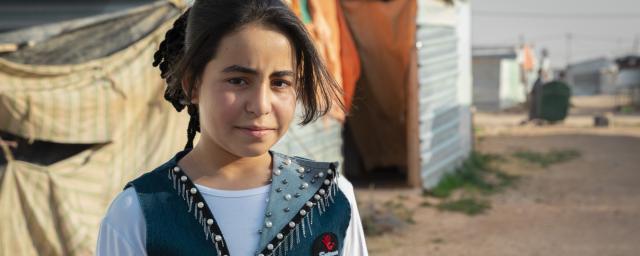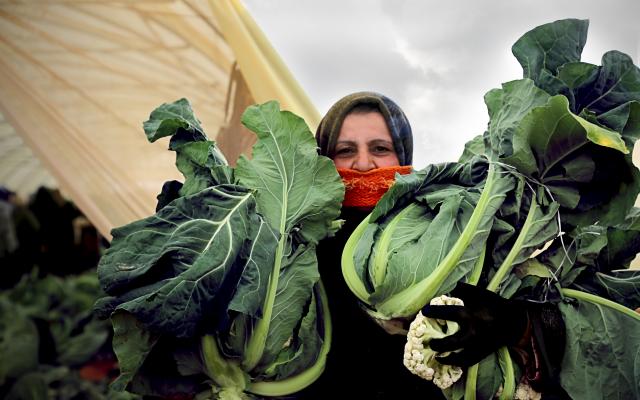
Muna*, 12, is a Syrian girl from Eastern Ghouta. She arrived in Za’atari with her family when she was just six years old. She can’t remember much about her life back in Syria, but she does recall some memories of being with her family in their house, which is now destroyed. Photo: Nesma Al Nsour/Oxfam
Located in northern Jordan, Za’atari refugee camp hosts around 80,000 Syrians who have been forced to flee the war in Syria. More than half of these refugees are children. Since 2012 the camp, divided into 12 districts, has grown from a collection of tents to a semi-permanent city. At its peak, it housed around 150,000 Syrian refugees, becoming the fourth-largest city in Jordan.
For the refugees it is the nearest thing to home, but many are still struggling to find work, surviving on limited aid or working illegally. Less than a fifth of them have current work permits. Women in particular are excluded from employment opportunities as they battle with social norms that dictate that they stay close to home.
Ahmad, 22, is a young man from southern Syria. He fled to Jordan’s Za’atari camp when he was just 15 years old. His dream is to become a famous fashion designer. He received a scholarship to take a course on fashion design from a leading college in Jordan. But it only covered the course fees, and the cost of transport and resources for college were too much for him to afford, so he was forced to sell the barbershop he owned in the camp which provided him with a living. Photo: Nesma Al Nsour/Oxfam
Oxfam currently works in 3 of Za’atari’s districts, supporting around 21 000 people in the camp, as well as 35 000 refugees in Jordan as a whole. As the crisis has persisted, we have adapted our approach to promote and enact more sustainable solutions to meet the needs of both camp residents and a vulnerable local community.
Work, water, and waste are key areas of our programming, with a focus on gender equality playing an essential part.
Turning waste into work
Oxfam is one of the lead agencies in the provision of water and sanitation to the camp. We worked with UNICEF and other international actors to install the largest ever water network in a refugee camp, providing access to drinking water at a household level. We also co-ordinate hygiene promotion activities which are crucial in preventing the spread of disease.
In 2015, we began piloting an innovative recycling project with the aim of mitigating the waste management issues in the camp while providing livelihood opportunities to refugees.
Drawing on the know-how of both Syrian refugees and Jordanian host communities, the project has expanded to collecting, sorting and processing waste from across the whole camp, and outside the camp to serve vulnerable communities in Jordan.
When Jasem Al-Wrewir fled from Al-Ghouta to Jordan in 2013, he had to abandon his waste disposal business, which he had built up over a period of fifteen years. Jasem was a prosperous entrepreneur who managed 6 rubbish dumps and employed over 200 people. As a refugee in Zaatari, he has been instrumental in establishing the recycling system in the camp, which he manages with 5 workers. Although he earns in four months what he used to earn in a day in Syria, it helps him to support his family. Photo: Jorge Fernandez Mayoral/Oxfam
The recycling programme’s success was entirely reliant on the participation and buy-in of the Za’atari camp community. Oxfam’s cash for work team educate the community on recycling, collect recyclable materials from households, and process the waste into materials that can be sold to traders. In 2019 alone, the program created over 1,000 jobs every month.
Today, 88% of households of the 80,000 residents separate their recyclable materials which make their way to two recycling facilities operated by Oxfam. We have reached a milestone of recycling 4,000 tons of waste since 2017.
SuperAdobe is a temporary building approach that Oxfam piloted in Za’atari refugee camp, shaping a more environmentally friendly, livable and dignified future for Syrian refugees in Jordan. It is a form of “sandbag architecture” that requires plastic bags, wire, and sand gathered on site. The SuperAdobes are warm in the winter and cool in the summer, a necessity in a desert environment where summer temperatures reach as high as 104 degrees.
Improving women’s skills and confidence
Despite making up approximately half of all residents at the camp, women’s economic participation is extremely low due to engrained social and cultural norms. Out of the 13,220 refugees who have active work permits, only 20% are women. Oxfam’s programs in Za’atari are all specifically tailored to address these issues. We work closely with Jordanian civil society, in particular women’s rights organizations, to improve skills, confidence and generate income.
We initiated the Lel-Haya (For Life) project in the camp to build the capacities of Syrian refugee women. The program enables them to upcycle old UNHCR tents and turn them into reusable bags sold around the world. Over several months, Oxfam tracked a small number of women involved in the project who were subsequently employed by a garment factory in northern Jordan.

A Syrian refugee woman with a harvest of cauliflower, to be sold at the local market. Photo: Nesma Al Nsour/Oxfam
In 2017, we opened four greenhouses in the camp that train and employ women to grow, harvest and sell local produce. Around 45 Syrian women have developed new skills and networks through hands-on learning and earn a small income by cultivating vegetables for sale in the nearby communities. They took part in technical training on water, soil, natural resource management, safety and use of tools and agricultural materials.
Support our work to help vulnerable Syrians rebuild their lives
The international community needs to do much more to help over 5 million refugees who have fled Syria since 2011 in search of safety in neighbouring countries – particularly Lebanon, Turkey, and Jordan. In Lebanon and Jordan, Oxfam has to date helped some 300,000 people affected by the Syria crisis. In light of the COVID-19 pandemic, host countries should not be left to shoulder the crisis on their own.

